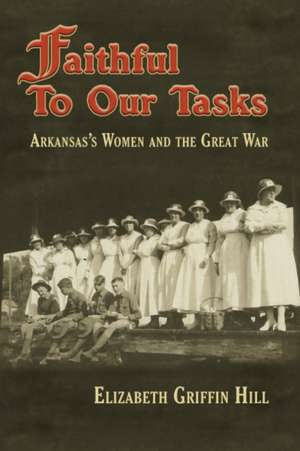Faithful to Our Tasks: Arkansas's Women and the Great War
Autor Elizabeth Griffin Hillen Limba Engleză Paperback – 28 feb 2017
The United States was a vital, if brief, participant in World War I—spending only eighteen months fighting in “the Great War.” But that short span marked an era of tremendous change for women as they moved out of the Victorian nineteenth century and came into their own as social activists during the early years of the twentieth century.
Faithful to Our Tasks provides the context for women’s actions and reactions during the war. It incorporates the mitigating factors and experiences of American women in general and compares Arkansas women’s Progressive Era actions with those of other southern women. The contextual underpinnings provide a rich tapestry as we attempt to understand our grandmothers and great-grandmothers’ responses to wartime needs.
Primary records of the World War I era, accessed in archives in central Arkansas, reveal that the state’s organized women were suddenly faced with a devastating world war for which they were expected to make a significant contribution of time and effort. “Club women” were already tackling myriad problems to be found in abundance within a poor, rural state as they worked for better schools, a centralized education system, children’s well-being, and improved medical care.
Under wartime conditions, their contributions were magnified as the women followed a barrage of directions from Washington, DC, within a disconcerting display of micromanagement by the federal government. The important takeaway, however, is that the Great War created a scenario in which Arkansas’s organized women—as well as women throughout the nation—would step forward and excel as men and governments stood up and took notice. After the war, these same organized women won the right to vote.
Faithful to Our Tasks provides the context for women’s actions and reactions during the war. It incorporates the mitigating factors and experiences of American women in general and compares Arkansas women’s Progressive Era actions with those of other southern women. The contextual underpinnings provide a rich tapestry as we attempt to understand our grandmothers and great-grandmothers’ responses to wartime needs.
Primary records of the World War I era, accessed in archives in central Arkansas, reveal that the state’s organized women were suddenly faced with a devastating world war for which they were expected to make a significant contribution of time and effort. “Club women” were already tackling myriad problems to be found in abundance within a poor, rural state as they worked for better schools, a centralized education system, children’s well-being, and improved medical care.
Under wartime conditions, their contributions were magnified as the women followed a barrage of directions from Washington, DC, within a disconcerting display of micromanagement by the federal government. The important takeaway, however, is that the Great War created a scenario in which Arkansas’s organized women—as well as women throughout the nation—would step forward and excel as men and governments stood up and took notice. After the war, these same organized women won the right to vote.
Preț: 118.05 lei
Nou
Puncte Express: 177
Preț estimativ în valută:
22.59€ • 23.54$ • 18.70£
22.59€ • 23.54$ • 18.70£
Carte indisponibilă temporar
Doresc să fiu notificat când acest titlu va fi disponibil:
Se trimite...
Preluare comenzi: 021 569.72.76
Specificații
ISBN-13: 9781945624001
ISBN-10: 1945624000
Pagini: 270
Ilustrații: 25 images
Dimensiuni: 152 x 229 x 18 mm
Greutate: 0.25 kg
Ediția:1
Editura: Butler Center for Arkansas Studies
Colecția Butler Center for Arkansas Studies
ISBN-10: 1945624000
Pagini: 270
Ilustrații: 25 images
Dimensiuni: 152 x 229 x 18 mm
Greutate: 0.25 kg
Ediția:1
Editura: Butler Center for Arkansas Studies
Colecția Butler Center for Arkansas Studies
Notă biografică
Elizabeth Griffin Hill is an independent researcher and writer specializing in the history of Arkansas women and holds a master of arts degree in rhetoric and writing. She is the author of A Splendid Piece of Work, a history of Arkansas’s home demonstration and Extension Homemakers clubs. Hill also was a contributor to an anthology that explored the effects of World War I on the state of Arkansas—To Can the Kaiser (Butler Center Books, 2015). She expanded her research for that essay into Faithful to Our Tasks.
